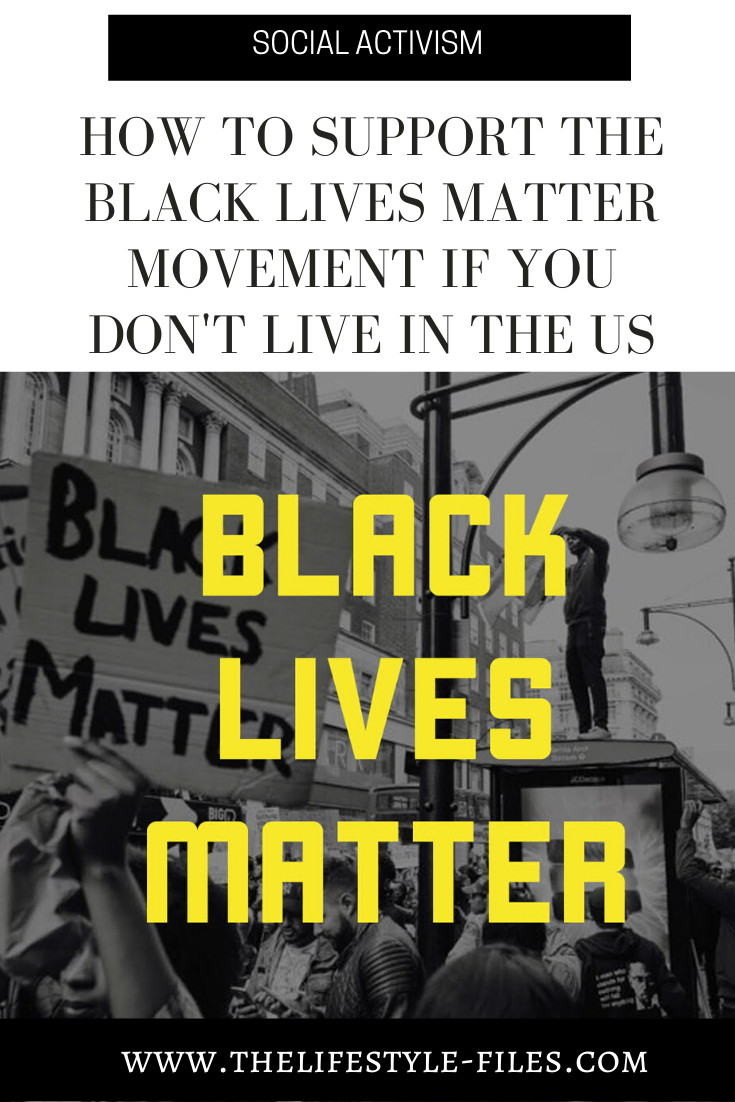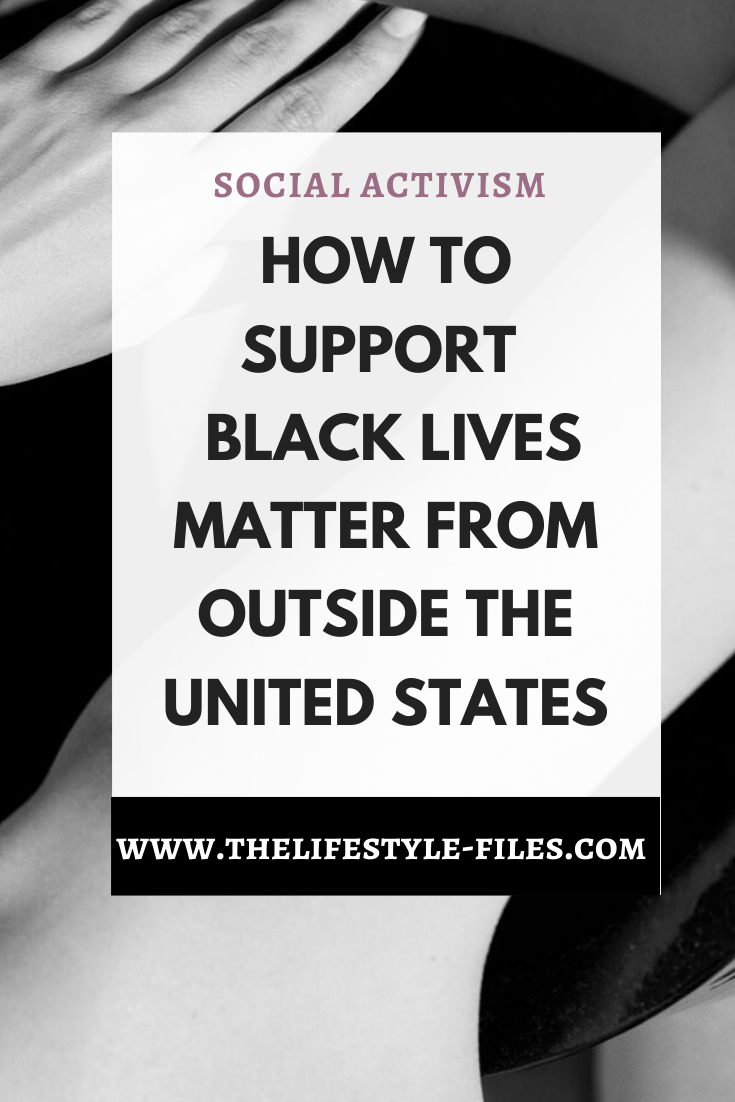
Like many of you, I have spent the last week trying to find the best ways to stand in solidarity with and support the Black Lives Matter movement. Of course, there are the obvious means of spreading awareness, sharing information and resources, as well as educating myself about how to be antiracist, but most of the time, these feel woefully insufficient. Showing social media support, reading books, and having discussions are important first steps, but what are the true meaningful actions we can do to help uproot this unjust system? Most of the things I’d consider as actual actions, like participating at protests, voting in both local and national elections, initiating educational, workplace, municipal, or community changes are not available to those of us who are not living there or are not US citizens. Still, we must continue to try to come up with ways we can meaningfully contribute to the fight against racism and white supremacy.
Here are a couple of action steps we can make to support the Black Lives Matter movement even from afar. If you have any other ideas, please share them with me.
Educate yourself
Educating ourselves about the long history of oppression and its destructive effects that continue to determine and limit the life and opportunities of Black communities and people; white privilege and how ALL of us, white people are benefiting from it; and systemic racism and its many over and covert manifestations is one of the most crucial (first) steps we must make to become better allies of the Black Lives Matter Movement.
View this post on Instagram
The below lists are just starter recommendations by (and also, in many cases for) myself. There are so many incredibly valuable resources available on the Internet that frankly, there’s no excuse not to start this educational journey today.
Nonfiction books
- Ijeoma Oluo: So You Want to Talk About Race
- Reni Eddo-Lodge: Why I’m No Longer Talking to White People About Race
- Robin Diangelo: White Fragility
- Ibram X. Kendi: How To Be an Antiracist
- Michelle Alexander: The New Jim Crow
- Ta Nehisi-Coates: Between the World and Me
- Angela Davis: Women, Race & Class
More nonfiction books and writings:
- An anti-racist reading list from Ibram X. Kendi
- Readings on racism, white supremacy, and police violence in America
Fiction books, novels
- Chimamanda Ngozi Adichie: Americanah
- Yaa Gyasi: Homegoing
- Colson Whitehead: The Underground Railroad
- Colson Whitehead: The Nickel Boys
- Toni Morrison: Beloved
- Toni Morrison: Song of Solomon
- Toni Morrison: The Bluest Eye
- Zora Neale Hurston: Their Eyes Were Watching God
- Richard Wright: Native Son
- Jacqueline Woodson: Red at the Bone
- Imbolo Mbue: Behold the Dreamers
- Edward P. Jones: The Known World
- Angie Thomas: The Hate U Give
- Jesmyn Ward: Sing, Unburied, Sing
More novel recommendations and contemporary black authors and books:
Documentaries and movies
- 13th
- Get Out
- When They See Us
- Blackkklansman
- The Hate U Give
- Dear White People
Podcasts
- 1619
- About Race
- The Diversity Gap
- Lynching in America
- Intersectionality Matters with Kimberlé Crenshaw
- Code Switch
- Justice in America
5 black female educators and social activists to follow on social media:
- Rachel Cargle: Instagram, Twitter
- Aja Barber: Instagram
- Tamika D. Mallory: Instagram, Twitter
- Ijeoma Oluo: Instagram
- Monique Melton: Instagram
Sign petitions
Probably the easiest way to support Black Lives Matter and help put pressure on the US government and institutions to demand justice and start critical reforms.
Some petitions that can be signed from outside of the US as well: #WeCantBreathe, Justice for George Floyd campaigns, or these petitions.

Donate
Providing financial support to organizations and communities on the frontline can be done from anywhere if you can afford to do so. It’s important to make some research before donating to ensure your financial help gets to the organizations that need the money the most at the moment. Some of the major organizations received an overwhelming amount of financial support in the last week and they now urge people to send donations elsewhere. If you have local contacts, friends, community organizers, the best way may be to ask them for recommendations.
Here are some lists where you can start the research:
Support BIPOC (Black, Indigenous, People of Color) owned businesses
Put pressure on large retailers to buy from black-owned businesses – contact them directly, DM them on social media, or sign this petition calling upon major American retailers to dedicate 15% of their shelf space to support black-owned businesses.
Buy directly from BIPOC-owned businesses, artists, creatives, and designers. Besides the purchases we make now, let’s commit to continue diversifying which business we support in the future and let’s focus more on small, minority-owned businesses:
- 25 Black-owned businesses you can support right now
- 77 Black-owned businesses to support
- 125 Best black-owned beauty brands to support
Fight politicized media coverage and help people understand what’s happening and why
Photos, videos, and news from the US currently dominate most news cycles around the world but that doesn’t mean that people get an accurate image of what’s really happening and why. A lot of people here in Hungary don’t speak English, have never been to the US, have a minimal understanding of historic and current race relations, and have never been called on to get a grasp on white privilege as it was never a part of the mainstream discussion.
But they are also massively manipulated by right-wing media, which in Hungary unfortunately totally dominates the media landscape and especially public channels. I keep seeing the same twisted stories about violent looters totally destroying the country, far-left radicals like ANTIFA fueling the tension, George Soros in the background trying to overthrow Trump, and some unique Hungarian twists thrown into the mix that are in line with the government communication (e.g. that riots are manifestations of anti-Christianity). The fact that Breitbart is frequently cited as a credible source in mainstream articles is probably enough for you to get a picture of how bad some media reports are.
So, it’s our responsibility to stand up to these voices and help spread the truth, help people understand what’s really going on, and why this is a global issue. It can be done through reports, opinion pieces, comments, and, most importantly, talking to our immediate circles – friends, family, coworkers, and acquaintances.
View this post on Instagram
Translate and share critical resources
While there is an abundance of anti-racism resources, most of these books and writings are only available in English. Besides the language-barrier, physical availability is also an issue – I have checked the major book retailers in Hungary for example and not one of them currently stack the above-mentioned anti-racist books. Here are a couple of things we can do to ensure critical information can reach more people:
- Translate excerpts, quotes, definitions and disseminate among your non-English speaking friends and family
- Contact publishers with a reading list and ask them to consider translating and publishing some of them
- Contact book shops and ask them to stack copies of anti-racist books and books by non-white authors
- Once you’ve read the books, donate them to your local library or school
- Talk to your alma mater or kids’ school and start a discussion about how they educate children about racism, white privilege, non-white culture
Investigate your country-specific local racism
While fighting racism is a global issue and in many ways, we are directly tied to historic injustices committed against black people (never forget Europe’s shameful complacency in the problem), Black Lives Matter mainly focuses on US-based issues. However, while we try to become global allies and do everything we can to support them, it’s also important to use this moment to reflect on local manifestations of racism and white supremacy – because there’s no country on Earth that is immune to that. For example, in Hungary, we may not have a sizable Black community, but we do have a large minority group, the Roma people and migrants – two groups that are constantly vilified, and are victims of both systemic and individual racism.
Let’s just not treat this issue as a special American problem. Let’s use our education and activism locally as well.





